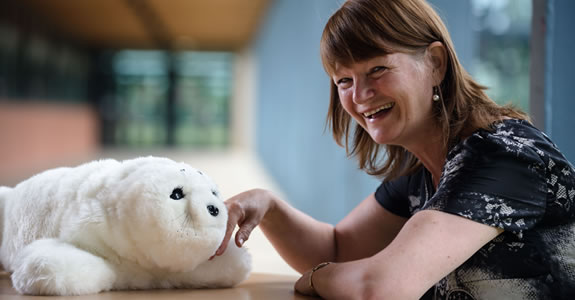Cute robotic animals help dementia patients


A robotic animal companion may provide a therapeutic effect to seniors struggling with dementia while adding few demands on nursing home staffs, new research has found.
Scientists at England's Northumbria University introduced several people with mid- to late-stage dementia to PARO, an interactive animatronic harp seal. PARO respond to touch and sound, responds to its owner's voice, and can give emotional responses. An overview of the study was published yesterday by the university's press office.
PARO's cuteness wasn't factored in, but in total, the robot positively influenced the behavior of patients in an Australian nursing home -- even more so than traditional techniques such as reading groups. The patients that participated in the study showed improved mental health with less anxiety and depression, and were found to have less of a tendency to "wander." PARO created a better quality of life.
(Interestingly enough, the plotline of an episode of The Simpsons called "Replaceable You" focused on how robotic baby seals soothed the nursing home population. The seals later ran amok on the entire town when pranksters rewired the seals for "fury.")
The Northumbria study was influenced by data showing that the presence of animals in nursing homes decreases feelings of loneliness and encourages social interaction. However, nursing staffs are burdened by caring for living animals and there's a risk of infection for patients, Northumbria noted in its press statement.
"Our study provides important preliminary support for the idea that robots may present a supplement to activities currently in use and could enhance the life of older adults as therapeutic companions and, in particular, for those with moderate or severe cognitive impairment," said Prof Cook, a Northumbria nursing professor.
"There is a need for further research, with a larger sample size, and an argument for investing in interventions such as PARO robots which may reduce dementia-related behaviours that make the provision of care challenging as well as costly due to increased use of staff resources and pharmaceutical treatment."
Other efforts to help seniors with high technology are focusing on assistive care robots, "smart canes," and caregiver-focused social media.
(image credit: Northumbria University)
Related on SmartPlanet:
- NASA creates Ironman like exoskeleton that could help disabled walk
- Start-up brings social collaboration to caregivers
- Lifesaving ‘smart cane' designed for seniors
This post was originally published on Smartplanet.com